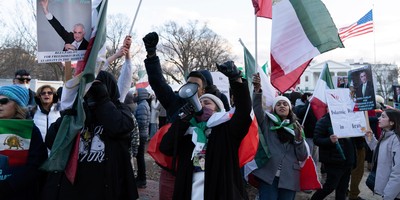There are few places in the world that beckon to those who share no common blood or history, but America has done so for centuries. It is one of the things that defines this great country. In celebrating the 232nd birthday of our nation this Fourth of July, it is worth recalling what Ronald Reagan said about the promise the United States holds out to so many.
In his farewell address, President Reagan explained: "I've spoken of the shining city all my political life, but I don't know if I ever quite communicated what I saw when I said it. But in my mind it was a tall, proud city built on rocks stronger than oceans, wind-swept, God-blessed, and teeming with people of all kinds living in harmony and peace; a city with free ports that hummed with commerce and creativity. And if there had to be city walls, the walls had doors, and the doors were open to anyone with the will and the heart to get here."
Jason Riley, a member of the Wall Street Journal's editorial board, quotes President Reagan's words in his new book, "Let Them In: The Case for Open Borders, Six Common Arguments Against Immigration and Why They Are Wrong." Like Reagan, Riley is an optimist, one who sees the United States as a land of unlimited opportunity and potential. It's a view in short supply lately but worth thinking about as we celebrate our nation's founding.
Riley's book will infuriate those who want to see America close her doors, throw up barriers, and shrink in size. Perhaps his most important contribution is exposing the origins of the modern immigration-restriction movement, whose founders come out of radical environmentalist and population-control groups. "Anti-immigrant sentiment coming from the political right tends to dominate the headlines, but the environmental left has always played a central role in efforts to tighten the U.S. border. For restrictionist greens, though, the main issue isn't the economy or even homeland security. It's the human species," he says.
Recommended
But as Riley points out, people aren't a problem. In fact, people constitute the nation's real wealth, even those who don't seem likely candidates to fill that role. Riley argues that low-skilled immigrants are an asset, not a threat, filling niches in our economy that make us both more efficient and richer. "This isn't about immigrants displacing Americans in the labor force," he says. "It's about foreign workers coming here to fill jobs that the natives don't want because they've got better opportunities."
Take agriculture. Americans are not filling the jobs left vacant because of recent crackdowns on illegal workers, so growers are relocating south of the border. "The reality is that U.S. companies will either grow food domestically that is harvested by foreign workers," Riley writes, "or import food harvested by foreign workers."
But, of course, not all immigrants are low-skilled farm workers.
Riley reports on one study that found that between 1991 and 2006, immigrants started an amazing 25 percent of all U.S. public companies that were backed by venture capital, and these companies' market capitalization exceeded a half-trillion dollars. And the foreign-born swell our engineering, science, computer, and math programs at the undergraduate and graduate level, as well.
Riley also tackles the myth that immigrants aren't assimilating -- a misconception I've been fighting for years, as he generously acknowledges. Today we worry about Mexicans and Guatemalans, but not so long ago it was Germans, Italians, and the Irish who we were sure would never become Americans. As Riley points out, the Irish immigrants of the 19th century (my great-grandparents Michael McKenna and Catherine Dolan among
them) were "dirt-poor peasants back home. ... Most were uneducated. Many spoke no English. ... They were stereotyped as slow-witted drunks and ne'er-do-wells who would never acculturate to America."
Yet they did become Americans -- as has every group, no matter where they came from. That is the wonder of America, that we can transform the most unpromising of newcomers. And within a generation or two, they are indistinguishable in all important aspects from those whose families have been here since the founding.
We shouldn't give up on this great American ideal. Ronald Reagan certainly never did.
























Join the conversation as a VIP Member